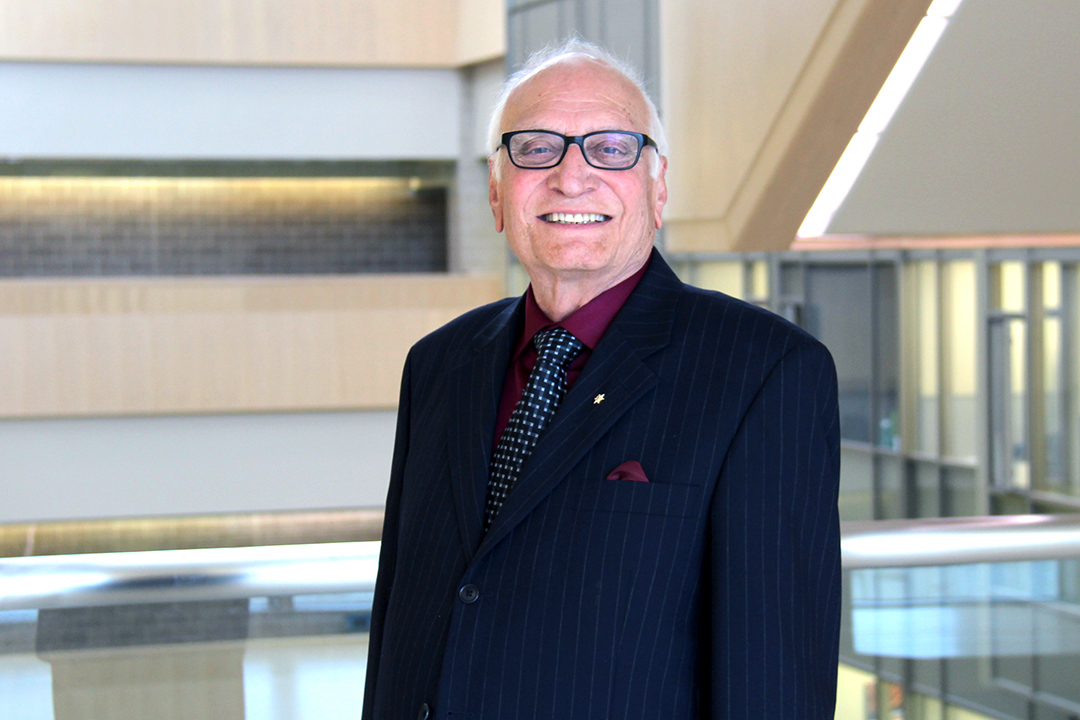
Celebrating Sharma’s record of research
When University of Saskatchewan (USask) researcher Dr. Rajendra Sharma (PhD, DSc'04) received the Saskatchewan Order of Merit in 2004, he thought back to one of the biggest supporters in his scientific career: his father.
By KRISTEN MCEWENWhile Sharma was growing up in small town in India, his father would read in newspapers about the discoveries that scientists were making around the world. He wanted his son to be one of them.
“He would say, ‘You have to become a scientist,’” Sharma said.
His father’s wishes came true. Sharma went on to complete his PhD in biochemistry at the All India Institute of Medical Sciences in New Delhi, and later moved to Boston, Mass., for a post-doctoral fellowship at Tufts University.
In 1976, he moved to Canada—first to Winnipeg and then to Calgary. Sharma was then hired at USask in 1991 to rejuvenate basic science research within the College of Medicine’s Department of Pathology and Laboratory Medicine.
Throughout his career, Sharma’s lab has purified and characterized more than two dozen proteins from various species. Through the purification process, he discovered close to a dozen new activator and inhibitor proteins, and established their biological and physiological functions.
The distinguished professor continues to excel in the field of cutting-edge colorectal cancer research, among other areas.
In 1995, Sharma and his team discovered that a protein enzyme labelled N-myristoyltransferase (NMT) is active and present in cancerous colon tissues, and appears in the early stages of colorectal cancer, which has a high mortality rate worldwide.
“My idea was to identify a marker for the early detection of cancer. We can save lots of people from undergoing a colonoscopy, that is expensive and painful,” Sharma said.
While there is no replacement for the procedure, Sharma and his team created a way to use the enzyme as a marker to see if colorectal cancer is present. This test has been licensed and is currently being developed at Bertech Pharma Ltd., an Edmonton company that is conducting clinical trials.
When it comes to research, collaboration is key, Sharma said. He has developed ties with numerous colleagues and researchers around the world, to make milestone discoveries.
“My father used to say that it takes too much time to gain wisdom, but it takes such little time to share knowledge,” he added.
Now 77, Sharma is currently serving as editor-in-chief for the Journal of Molecular Biology and Therapeutics. He has gained expertise in the world of scientific journals, publishing nearly 250 full-length papers and 154 national and international abstracts.
Four decades of his research have also been summarized in three review articles, one of which has been published in the journal Cell Calcium (2018), and the other two published recently in the Journal of Molecular Biology and Therapeutics.
Sharma acknowledges the contributions and dedication of post-doctoral fellows, research assistants, graduate students and summer students in his laboratory.
When he does decide to finally step away from research, Sharma said he plans to spend time with his wife, his three daughters and their families. He would like to pass on the spark of research and the love of learning to future generations and he also wants to take up volunteer work, visiting hospitals as well as long-term care centres which may not often receive visitors.
Sharma is very proud of his Indian roots and heritage and still makes visits to his hometown overseas.
“I’m very thankful to my colleagues at the College of Medicine who have supported me in my endeavours,” he said. “I wouldn’t be where I am today if it were not for my family.”
Article originally published on https://news.usask.ca/.

